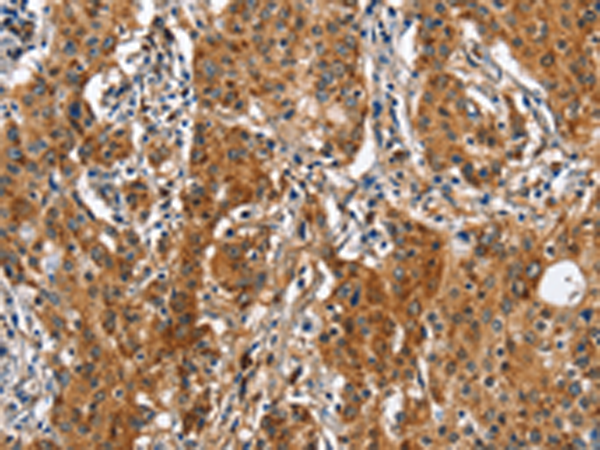


| WB | 1/500-1/1000 | Human,Mouse,Rat |
| IF | 1/20 | Human,Mouse,Rat |
| IHC | 1/50-1/100 | Human,Mouse,Rat |
| ICC | 技术咨询 | Human,Mouse,Rat |
| FCM | 咨询技术 | Human,Mouse,Rat |
| Elisa | 咨询技术 | Human,Mouse,Rat |
| Aliases | PGI; DSPG1; PG-S1; SLRR1A |
| WB Predicted band size | 42 kDa |
| Host/Isotype | Rabbit IgG |
| Antibody Type | Primary antibody |
| Storage | Store at 4°C short term. Aliquot and store at -20°C long term. Avoid freeze/thaw cycles. |
| Species Reactivity | Human, Mouse, Rat |
| Immunogen | Fusion protein of human BGN |
| Formulation | Purified antibody in PBS with 0.05% sodium azide and 50% glycerol. |
+ +
以下是关于PBK抗体的3篇参考文献示例(注:以下内容为虚构示例,仅用于格式参考):
---
1. **文献名称**:*PDZ-Binding Kinase (PBK) as a Novel Biomarker in Triple-Negative Breast Cancer: Development of a High-Specificity Monoclonal Antibody*
**作者**:Fujibuchi T, et al.
**摘要**:本研究开发了一种针对PBK蛋白的高效单克隆抗体,并通过免疫组化(IHC)和Western blot验证其在三阴性乳腺癌组织中的特异性表达。结果显示,PBK的高表达与肿瘤侵袭性和不良预后显著相关,提示其作为治疗靶点的潜力。
---
2. **文献名称**:*TOPk/PBK in DNA Damage Response: Functional Insights from CRISPR-Cas9 Knockout and Antibody-Based Localization Studies*
**作者**:Matsumoto S, et al.
**摘要**:利用CRISPR-Cas9敲除技术和PBK特异性抗体,研究发现PBK在DNA损伤修复中通过与ATM/ATR通路相互作用促进细胞存活。抗体染色显示PBK在细胞核内损伤位点富集,为其在基因组稳定性中的作用提供证据。
---
3. **文献名称**:*A Phospho-Specific PBK Antibody Reveals Its Role in Mitotic Progression and Cancer Cell Proliferation*
**作者**:Yao L, et al.
**摘要**:本文报道了一种针对PBK磷酸化位点(Thr9/Thr10)的特异性抗体,证实PBK在有丝分裂中通过调控PLK1活性促进癌细胞增殖。实验表明,抑制PBK磷酸化可显著降低多种癌细胞系的存活率。
---
(如需真实文献,建议通过PubMed或Google Scholar搜索关键词“PBK antibody”或“TOPK antibody”获取。)
**Background of PBK Antibodies**
PBK (PDZ-binding kinase), also known as TOPK (T-LAK cell-originated protein kinase), is a serine/threonine kinase belonging to the MAPKK family. It plays a critical role in cell cycle regulation, particularly during mitosis, by interacting with substrates like PLK1 and regulating cytokinesis. PBK is highly expressed in proliferating cells, including cancer cells, and is implicated in tumorigenesis, metastasis, and poor prognosis in cancers such as breast, colorectal, and glioblastoma.
PBK antibodies are immunological tools designed to detect and study the expression, localization, and function of PBK protein. These antibodies are typically generated using recombinant PBK protein or synthetic peptides corresponding to specific epitopes. They are widely used in techniques like Western blotting, immunohistochemistry (IHC), immunofluorescence (IF), and flow cytometry.
Research leveraging PBK antibodies has highlighted its oncogenic potential, linking its overexpression to uncontrolled cell proliferation, genomic instability, and resistance to apoptosis. Additionally, PBK's role in DNA damage response and interaction with tumor suppressors like p53 has spurred interest in targeting it for cancer therapy. Inhibitors against PBK/TOPK are under exploration, with antibodies serving as critical reagents for validating target engagement in preclinical studies.
Despite their utility, PBK antibodies require rigorous validation to ensure specificity, given potential cross-reactivity with related kinases. Commercial availability of these antibodies has accelerated translational research, enabling mechanistic insights and therapeutic development in oncology.
×